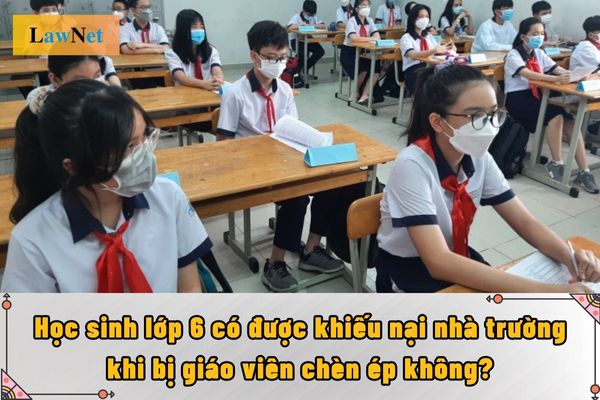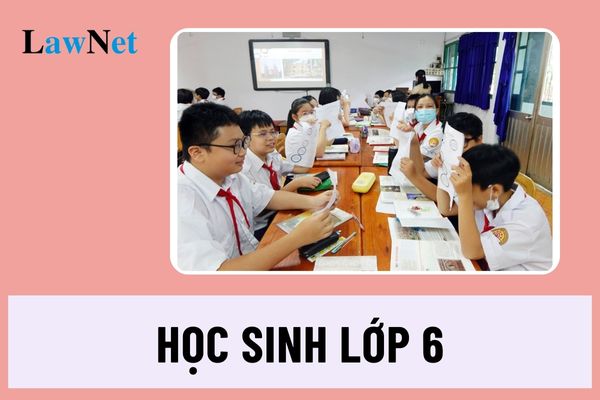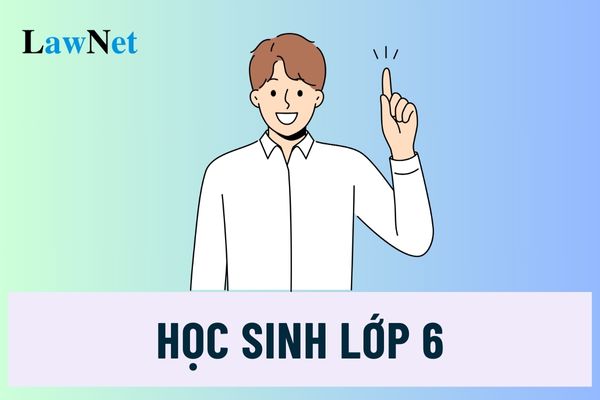How old are 6th-grade students in Vietnam? Do 6th-grade students have the right to complain to the school if they are oppressed by teachers?
How old are 6th-grade students in Vietnam?
Pursuant to Article 28 of the Education Law 2019, the regulations on educational levels and ages are as follows:
Educational Levels and Ages
1. The educational levels and ages are regulated as follows:
a) Primary education is conducted over 5 years, from first grade to the end of fifth grade. The age for students entering first grade is 6 years old and is calculated by year;
b) Lower secondary education is conducted over 4 years, from 6th-grade to the end of ninth grade. Students entering 6th-grade must have completed the primary education program. The age for students entering 6th-grade is 11 years old and is calculated by year;
c) Upper secondary education is conducted over 3 years, from tenth grade to the end of twelfth grade. Students entering tenth grade must have a lower secondary school diploma. The age for students entering tenth grade is 15 years old and is calculated by year.
Lower secondary education is conducted over 4 years, from 6th-grade to the end of ninth grade.
Students entering 6th-grade must have completed the primary education program.
The age for students entering 6th-grade is 11 years old and is calculated by year.
Except for cases where students skip grades or are older than the prescribed age, typically lower secondary students are between 11 and 14 years old.
Thus, according to the aforementioned regulations, 6th-grade students are 11 years old. Except for cases where students skip grades or are older than the prescribed age, typically lower secondary students are between 11 and 14 years old.

How old are 6th-grade students in Vietnam? Do 6th-grade students have the right to complain to the school if they are oppressed by teachers? (Image from the Internet)
Do 6th-grade students have the right to complain to the school if they are oppressed by teachers?
Pursuant to Clause 2 Article 35 of the Charter for Lower Secondary Schools, Upper Secondary Schools, and Multi-level Schools issued with Circular 32/2020/TT-BGDDT stipulates specifically:
Rights of Students
1. Equal access to comprehensive education, ensured conditions in terms of time, facilities, hygiene, and safety for classroom learning and self-study at home, provided with information about their own academic achievements and behavior, use of equipment and means for school activities.
2. To be respected and protected, treated equally and democratically, to have the right to complain to the school and educational management levels about decisions concerning themselves; to have the right to transfer schools with a legitimate reason according to current regulations; to study ahead of age, to skip grades, and to study older than the prescribed age according to Article 33 of this Charter.
3. To participate in activities aimed at developing their talents in subjects, sports, and arts organized by the school if they meet the conditions.
4. To receive scholarships or other support according to regulations for students under social policies, students with difficult living conditions, and students with special talents.
5. To transfer schools if they meet the required conditions; the transfer procedure is implemented according to the regulations of the Minister of Education and Training.
6. To enjoy other rights as prescribed by law.
At the same time, the duties of 6th-grade students according to Article 34 of the Charter for Lower Secondary Schools, Upper Secondary Schools, and Multi-level Schools issued with Circular 32/2020/TT-BGDDT stipulates specifically:
- Perform learning and training tasks according to the school's educational program and plan.
- Respect parents, school staff, teachers, and elders; unite and help each other in learning and training; comply with the school charter and regulations; obey the laws of the State.
- Exercise, maintain personal hygiene.
- Participate in collective activities of the school, class, the Ho Chi Minh Young Pioneer Organization, the Ho Chi Minh Communist Youth Union; help families, participate in labor and social activities, environmental protection activities, and obey traffic order and safety regulations.
- Maintain and protect school and public property; contribute to building, protecting, and promoting the school's traditions.
Besides that, point a Clause 1 Article 12 of the Law on Complaints 2011 regulates the rights and obligations of complainants as follows:
Rights and Obligations of Complainants
1. Complainants have the following rights:
a) To complain by themselves.
In case the complainant is a minor, legally incapacitated, their legal representative shall handle the complaint;
In case the complainant is sick, elderly, physically impaired, or for other objective reasons cannot complain by themselves, they may authorize their parents, spouse, siblings, adult children, or other fully capable individuals to handle the complaint;
...
Thus, according to the aforementioned regulations, 6th-grade students have the right to complain to the school about issues of oppression.
What are prohibited acts of 6th-grade students in Vietnam?
The acts that 6th-grade students are prohibited from doing according to Article 37 of the Charter for Lower Secondary Schools, Upper Secondary Schools, and Multi-level Schools issued with Circular 32/2020/TT-BGDDT are stipulated specifically:
(1) Insulting the dignity and honor, infringing on the body of teachers, school staff, others, and other students.
(2) Cheating in learning, exams, tests, and enrollment.
(3) Buying, selling, using alcohol, beer, tobacco, addictive substances, other stimulants, fireworks, and flammable substances.
(4) Using mobile phones and other devices during class not for learning purposes and without the teacher's permission.
(5) Fighting, disrupting order and security in the school and public places.
(6) Using, exchanging cultural products with violent, depraved content; playing with or using toys and games harmful to their healthy development.
(7) Students are also prohibited from other acts as prescribed by law.



- Vietnam: What is the sample report on a modern literary matter - innovations and renovations in the short stories "Chiếc thuyền ngoài xa" and "Một người Hà Nội"?
- Vietnam: What are the 05 sample 600-word argumentative essays on negative issues among youth today? How many types of texts are there in the content of the 12th-grade Literature curriculum?
- Vietnam: What are the best sample paragraphs about your family for 6th-grade students? What elective subjects do 6th-grade students learn?
- Vietnam: What are the best sample self-introductions in English for 5th-grade students? What topics are covered by the 5th-grade English curriculum?
- Vietnam: What are the sample imaginary paragraphs on Tin-tin and Mi-tin entering the magical garden for 4th-grade students? What are the 05 essential qualities required for 4th-grade students?
- Vietnam: What are the guidelines for preparing the briefest lesson "A Strange Tale of the Fisherman's House/Truyện lạ nhà thuyền chài"? What is the eligibility for lower secondary graduation recognition for 9th-grade students?
- What are the enrollment methods of Pham Ngoc Thach University of Medicine in 2025?
- Vietnam: What are the sample 1st end-of-semester question papers of 9th-grade Literature? What is the form of assessment for 9th-grade Literature?
- Vietnam: What are the 10 sample 200-word social argumentative paragraphs on the strength of discipline? Is improving manpower one of the goals of education?
- What are the sample social argumentative essays on a social issue raised from a literary work in the 8th-grade Literature curriculum in Vietnam?

